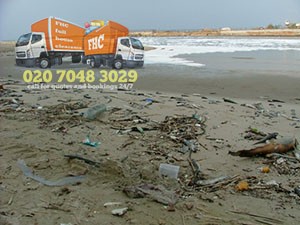Plastic is one of the main materials that are recycled around the world. There are good reasons for this. First and foremost, the production of the raw material for plastic bottles, cups, containers etc. involves many resources, including clean water and oil that make the whole process pretty expensive. Thus, recycling provides a cost-efficient solution. On the other hand, there is a purely environmental reason for recycling plastic – because it degrades in nature at such a slow rate that the thousands of tons of plastic thrown away in the garbage on a daily basis around the globe are going to pollute the planet for the centuries to come. Putting the old products in good use is the sensible thing to do in such a situation.
But as a recent study has shown, the efforts put in that direction in the past couple of years are not enough.
 The Spanish researchers who conducted the study say that unimaginable amount of plastic junk, mainly in the form of used bottles, plastic bags and wrappings freely roam the surface of the Mediterranean Sea thus endangering the ecosystem of both the sea and the coasts of the three continents that surround it. And like this is not enough, traces of plastic have been found in the stomachs of fish, birds, turtles and whales, not to mention oysters and mussels that live not only in the Mediterranean region, but also in the seas washing Northern Europe, which is generally considered to be the leader in the recycling industry.
The Spanish researchers who conducted the study say that unimaginable amount of plastic junk, mainly in the form of used bottles, plastic bags and wrappings freely roam the surface of the Mediterranean Sea thus endangering the ecosystem of both the sea and the coasts of the three continents that surround it. And like this is not enough, traces of plastic have been found in the stomachs of fish, birds, turtles and whales, not to mention oysters and mussels that live not only in the Mediterranean region, but also in the seas washing Northern Europe, which is generally considered to be the leader in the recycling industry.
The problem however is the gravest in the Mediterranean. The scientists explain that the plastic pollution of the world’s oceans and seas has become a real problem in the past fifty years – before that it did not exist. Nevertheless today it is an issue of a global scale.
Now this is a serious problem on many levels. Seas and oceans are crucial for the sustenance of every eco-system. But the harm that can result from pollution of water masses that will affect humans is not only the hard to imagine, indirect and far-in-the-future fact that by harming nature we are making the world a much tougher place to live for the generations to come. The damage such pollution can cause to contemporary residents of Europe is much more direct. As we have already said, plastic junk is to be found in all types of fish, birds and other sea-live. A lot of those animals are used as food – a very liked and widely consumed type of food actually. So, when you consume food that was polluted, you pollute your own body. Both in the short and the long term this may lead to serious health problems.
The only logical solution that comes to mind is to decrease the amount of plastic pollution in our seas. The only way to do that is, of course, proper waste management, junk removal and more serious attitude towards recycling. It is as simple as that – and just as complex.



